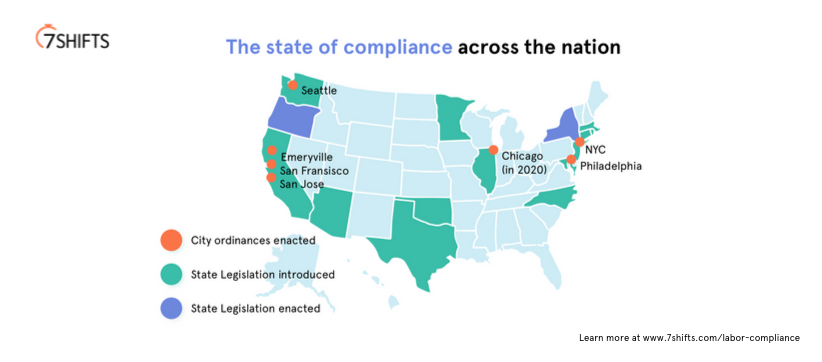Call Sales: +1 (833) 437-3835
Call Sales: +1 (833) 437-3835
Sydney Kida | October 16, 2019 |

Labor compliance, predictive scheduling, and Fair Workweek are terms on the mind of every restaurateur in America—and for good reason. As strict labor legislation continues to pass in more states and cities around the US, the threat of compliance fees and legal suits grows for restaurants.
 The cost of non-compliance
The cost of non-compliance By 2020, restaurants in the US will pay an estimated $30M+ in compliance fees, and regions with the laws enacted are already making legal moves.
New York City, which enacted their Fair Workweek legislation in 2017, has filed a $1 million suit against Chipotle for alleged violations of the laws. The city states that the brand has “ignored the core tenets of the Fair Workweek laws repeatedly”—one of their major violations being the last-minute nature of their staff scheduling.
Big brands are contending with major lawsuits, which are driving home the critical nature of complying with the new labor laws. These laws were ultimately designed to improve the quality of life for restaurant and shift workers.
However, it’s not all grim for restaurateurs.
Strict labor laws don’t necessarily mean higher labor costs for restaurants.
In a pilot program run by Gap, research showed that implementing fair scheduling practices had a positive impact on their bottom line—seeing a 5% increase in labor productivity, a 7% increase in median sales, and an overall increase in revenue of $290,000 across their 19 stores in the program. This stability offered by fair scheduling practices—creating schedules in advance and eliminating on-call scheduling—created happier and more reliable staff which overall lead to growth in their sales and efficiency.
By solidifying the staff schedule weeks in advance, and refraining from making last-minute changes, your labor projections will be more accurate and reliable. That reliability means more bottom line benefits for your restaurant, like improved sales per labor hour and labor costs.
The restaurant space is one of the most-affected industries by new laws, so every restaurateur should be aware of how to stay compliant. These three tips will get you on the path to compliance, and away from major fees.
By utilizing smart technology solutions, restaurants can take control of their compliance to avoid legal suits and compliance penalties alike. For example, integrating your restaurant technology systems like your Revel point of sale (POS) with 7shifts’ labor-compliant staff scheduling can ensure your managers are abiding by local labor laws while they’re scheduling.
Utilizing accounting integrations will give you further visibility and control over timesheets and employee attendance. These factors will keep your records straight and ensure your staff are properly compensated for their work—overtime hours and all.
Additionally, as your business grows, you must ensure every manager is fully trained during on-boarding (and on an ongoing basis) on the scheduling process to avoid any compliance slip-ups. Providing them with in-depth training on the tools and technology at their disposal will go a long way to keep your restaurant compliant.
Build better schedules in advance by leveraging the Revel + 7shifts integration to forecast sales and predict labor needs. Using software can make this process more simple by automatically projecting your sales to help you schedule accordingly. The more accurate you are about predicting future needs, the less you will pay in last-minute compliance change fees.
As new labor laws continue to pass in new states across the country, it’s critical to implement the right practices in your organization to stay compliant. Don’t take shortcuts on scheduling to save a few labor dollars—or you may be hit with fees and legal suits that could put you out of business.
Thankfully, in 2019, many software solutions and learning resources are at your disposal to keep your restaurant compliant.

Author bio:
Dew Smith is the Brand Strategist at 7shifts, Revel’s software partner that offers a labor management solution for restaurants to reduce labor costs and stay compliant. Dew researches and develops insightful content for restaurateurs to engage their staff, improve their operations, and stay on top of their labor management.